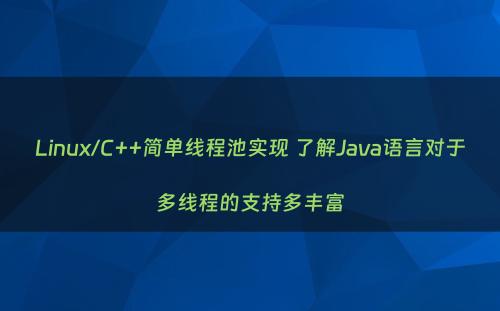网站首页 > 基础教程 正文
我们知道Java语言对于多线程的支持十分丰富,JDK本身提供了很多性能优良的库,包括ThreadPoolExecutor和ScheduleThreadPoolExecutor等。C++11中的STL也提供了std:thread(然而我还没有看,这里先占个坑)还有很多第三方库的实现。这里我重复“造轮子”的目的还是为了深入理解C++和Linux线程基础概念,主要以学习的目的。
首先,为什么要使用线程池。因为线程的创建、和清理都是需要耗费系统资源的。我们知道Linux中线程实际上是由轻量级进程实现的,相对于纯理论上的线程这个开销还是有的。假设某个线程的创建、运行和销毁的时间分别为T1、T2、T3,当T1+T3的时间相对于T2不可忽略时,线程池的就有必要引入了,尤其是处理数百万级的高并发处理时。线程池提升了多线程程序的性能,因为线程池里面的线程都是现成的而且能够重复使用,我们不需要临时创建大量线程,然后在任务结束时又销毁大量线程。一个理想的线程池能够合理地动态调节池内线程数量,既不会因为线程过少而导致大量任务堆积,也不会因为线程过多了而增加额外的系统开销。

其实线程池的原理非常简单,它就是一个非常典型的生产者消费者同步问题。根据刚才描述的线程池的功能,可以看出线程池至少有两个主要动作,一个是主程序不定时地向线程池添加任务,另一个是线程池里的线程领取任务去执行。且不论任务和执行任务是个什么概念,但是一个任务肯定只能分配给一个线程执行。这样就可以简单猜想线程池的一种可能的架构了:主程序执行入队操作,把任务添加到一个队列里面;池子里的多个工作线程共同对这个队列试图执行出队操作,这里要保证同一时刻只有一个线程出队成功,抢夺到这个任务,其他线程继续共同试图出队抢夺下一个任务。所以在实现线程池之前,我们需要一个队列。这里的生产者就是主程序,生产任务(增加任务),消费者就是工作线程,消费任务(执行、减少任务)。因为这里涉及到多个线程同时访问一个队列的问题,所以我们需要互斥锁来保护队列,同时还需要条件变量来处理主线程通知任务到达、工作线程抢夺任务的问题。
一般来说实现一个线程池主要包括以下4个组成部分:
- 线程管理器:用于创建并管理线程池。
- 工作线程:线程池中实际执行任务的线程。在初始化线程时会预先创建好固定数目的线程在池中,这些初始化的线程一般处于空闲状态。
- 任务接口:每个任务必须实现的接口。当线程池的任务队列中有可执行任务时,被空间的工作线程调去执行(线程的闲与忙的状态是通过互斥量实现的),把任务抽象出来形成一个接口,可以做到线程池与具体的任务无关。
- 任务队列:用来存放没有处理的任务。提供一种缓冲机制。实现这种结构有很多方法,常用的有队列和链表结构。
流程图如下:
ool.h
#ifndef __THREAD_POOL_H
#define __THREAD_POOL_H
#include <vector>
#include <string>
#include <pthread.h>
using namespace std;
/*执行任务的类:设置任务数据并执行*/
class CTask {
protected:
string m_strTaskName; //任务的名称
void* m_ptrData; //要执行的任务的具体数据
public:
CTask() = default;
CTask(string &taskName): m_strTaskName(taskName), m_ptrData(NULL) {}
virtual int Run() = 0;
void setData(void* data); //设置任务数据
virtual ~CTask() {}
};
/*线程池管理类*/
class CThreadPool {
private:
static vector<CTask*> m_vecTaskList; //任务列表
static bool shutdown; //线程退出标志
int m_iThreadNum; //线程池中启动的线程数
pthread_t *pthread_id;
static pthread_mutex_t m_pthreadMutex; //线程同步锁
static pthread_cond_t m_pthreadCond; //线程同步条件变量
protected:
static void* ThreadFunc(void *threadData); //新线程的线程回调函数
static int MoveToIdle(pthread_t tid); //线程执行结束后,把自己放入空闲线程中
static int MoveToBusy(pthread_t tid); //移入到忙碌线程中去
int Create(); //创建线程池中的线程
public:
CThreadPool(int threadNum);
int AddTask(CTask *task); //把任务添加到任务队列中
int StopAll(); //使线程池中的所有线程退出
int getTaskSize(); //获取当前任务队列中的任务数
};
#endif
2 thread_pool.cpp
#include "thread_pool.h"
#include <cstdio>
void CTask::setData(void* data) {
m_ptrData = data;
}
//静态成员初始化
vector<CTask*> CThreadPool::m_vecTaskList;
bool CThreadPool::shutdown = false;
pthread_mutex_t CThreadPool::m_pthreadMutex = PTHREAD_MUTEX_INITIALIZER;
pthread_cond_t CThreadPool::m_pthreadCond = PTHREAD_COND_INITIALIZER;
//线程管理类构造函数
CThreadPool::CThreadPool(int threadNum) {
this->m_iThreadNum = threadNum;
printf("I will create %d threads.\n", threadNum);
Create();
}
//线程回调函数
void* CThreadPool::ThreadFunc(void* threadData) {
pthread_t tid = pthread_self();
while(1)
{
pthread_mutex_lock(&m_pthreadMutex);
//如果队列为空,等待新任务进入任务队列
while(m_vecTaskList.size() == 0 && !shutdown)
pthread_cond_wait(&m_pthreadCond, &m_pthreadMutex);
//关闭线程
if(shutdown)
{
pthread_mutex_unlock(&m_pthreadMutex);
printf("[tid: %lu]\texit\n", pthread_self());
pthread_exit(NULL);
}
printf("[tid: %lu]\trun: ", tid);
vector<CTask*>::iterator iter = m_vecTaskList.begin();
//取出一个任务并处理之
CTask* task = *iter;
if(iter != m_vecTaskList.end())
{
task = *iter;
m_vecTaskList.erase(iter);
}
pthread_mutex_unlock(&m_pthreadMutex);
task->Run(); //执行任务
printf("[tid: %lu]\tidle\n", tid);
}
return (void*)0;
}
//往任务队列里添加任务并发出线程同步信号
int CThreadPool::AddTask(CTask *task) {
pthread_mutex_lock(&m_pthreadMutex);
m_vecTaskList.push_back(task);
pthread_mutex_unlock(&m_pthreadMutex);
pthread_cond_signal(&m_pthreadCond);
return 0;
}
//创建线程
int CThreadPool::Create() {
pthread_id = new pthread_t[m_iThreadNum];
for(int i = 0; i < m_iThreadNum; i++)
pthread_create(&pthread_id[i], NULL, ThreadFunc, NULL);
return 0;
}
//停止所有线程
int CThreadPool::StopAll() {
//避免重复调用
if(shutdown)
return -1;
printf("Now I will end all threads!\n\n");
//唤醒所有等待进程,线程池也要销毁了
shutdown = true;
pthread_cond_broadcast(&m_pthreadCond);
//清楚僵尸
for(int i = 0; i < m_iThreadNum; i++)
pthread_join(pthread_id[i], NULL);
delete[] pthread_id;
pthread_id = NULL;
//销毁互斥量和条件变量
pthread_mutex_destroy(&m_pthreadMutex);
pthread_cond_destroy(&m_pthreadCond);
return 0;
}
//获取当前队列中的任务数
int CThreadPool::getTaskSize() {
return m_vecTaskList.size();
}
3 main.cpp
#include "thread_pool.h"
#include <cstdio>
#include <stdlib.h>
#include <unistd.h>
class CMyTask: public CTask {
public:
CMyTask() = default;
int Run() {
printf("%s\n", (char*)m_ptrData);
int x = rand()%4 + 1;
sleep(x);
return 0;
}
~CMyTask() {}
};
int main() {
CMyTask taskObj;
char szTmp[] = "hello!";
taskObj.setData((void*)szTmp);
CThreadPool threadpool(5); //线程池大小为5
for(int i = 0; i < 10; i++)
threadpool.AddTask(&taskObj);
while(1) {
printf("There are still %d tasks need to handle\n", threadpool.getTaskSize());
//任务队列已没有任务了
if(threadpool.getTaskSize()==0) {
//清除线程池
if(threadpool.StopAll() == -1) {
printf("Thread pool clear, exit.\n");
exit(0);
}
}
sleep(2);
printf("2 seconds later...\n");
}
return 0;
}
4 Makefile
CC:= g++ TARGET:= threadpool INCLUDE:= -I./ LIBS:= -lpthread # C++语言编译参数 CXXFLAGS:= -std=c++11 -g -Wall -D_REENTRANT # C预处理参数 # CPPFLAGS:= OBJECTS :=thread_pool.o main.o $(TARGET): $(OBJECTS) $(CC) -o $(TARGET) $(OBJECTS) $(LIBS) # $@表示所有目标集 %.o:%.cpp $(CC) -c $(CXXFLAGS) $(INCLUDE) lt; -o $@ .PHONY : clean clean: -rm -f $(OBJECTS) $(TARGET)
5 输出结果
I will create 5 threads. There are still 10 tasks need to handle [tid: 140056759576320] run: hello! [tid: 140056751183616] run: hello! [tid: 140056742790912] run: hello! [tid: 140056734398208] run: hello! [tid: 140056767969024] run: hello! 2 seconds later... There are still 5 tasks need to handle [tid: 140056742790912] idle [tid: 140056742790912] run: hello! [tid: 140056767969024] idle [tid: 140056767969024] run: hello! [tid: 140056751183616] idle [tid: 140056751183616] run: hello! [tid: 140056759576320] idle [tid: 140056759576320] run: hello! [tid: 140056751183616] idle [tid: 140056751183616] run: hello! [tid: 140056734398208] idle 2 seconds later... There are still 0 tasks need to handle Now I will end all threads! 2 seconds later... [tid: 140056734398208] exit [tid: 140056767969024] idle [tid: 140056767969024] exit [tid: 140056759576320] idle [tid: 140056759576320] exit [tid: 140056751183616] idle [tid: 140056751183616] exit [tid: 140056742790912] idle [tid: 140056742790912] exit 2 seconds later... There are still 0 tasks need to handle Thread pool clear, exit.
自己因为比较喜欢技术,所以收集了一些Java高并发、分布式、JVM、spring、源码分析和kafka等架构技术资料
如果你也对技术感兴趣:
关注+转发后,私信关键词 【架构】即可免费获取!
重要的事情说三遍,转发、转发、转发后再发私信,才可以拿到!
猜你喜欢
- 2024-11-11 Linux下的C++ socket编程实例 linux c++ tcp
- 2024-11-11 C++11原子变量:线程安全、无锁操作的实例解析
- 2024-11-11 C++11的thread_local原理和应用范例
- 2024-11-11 知识重构-c++ : Lambda 知识重构拼音
- 2024-11-11 c++ 疑难杂症(4) std:vector c++ vector subscript out of range
- 2024-11-11 深入探索C++异步编程的奥秘 c++11异步编程
- 2024-11-11 C++ 开发中使用协程需要注意的问题
- 2024-11-11 golang极速嵌入式Linux应用开发(四)-协程与并发
- 2024-11-11 在计算机编程中,线程是指一个程序内部的执行流程
- 2024-11-11 C++ std:decay、std:bind、std:packaged_task 在模版编程的实践
- 最近发表
- 标签列表
-
- gitpush (61)
- pythonif (68)
- location.href (57)
- tail-f (57)
- pythonifelse (59)
- deletesql (62)
- c++模板 (62)
- css3动画 (57)
- c#event (59)
- linuxgzip (68)
- 字符串连接 (73)
- nginx配置文件详解 (61)
- html标签 (69)
- c++初始化列表 (64)
- exec命令 (59)
- canvasfilltext (58)
- mysqlinnodbmyisam区别 (63)
- arraylistadd (66)
- node教程 (59)
- console.table (62)
- c++time_t (58)
- phpcookie (58)
- mysqldatesub函数 (63)
- window10java环境变量设置 (66)
- c++虚函数和纯虚函数的区别 (66)
